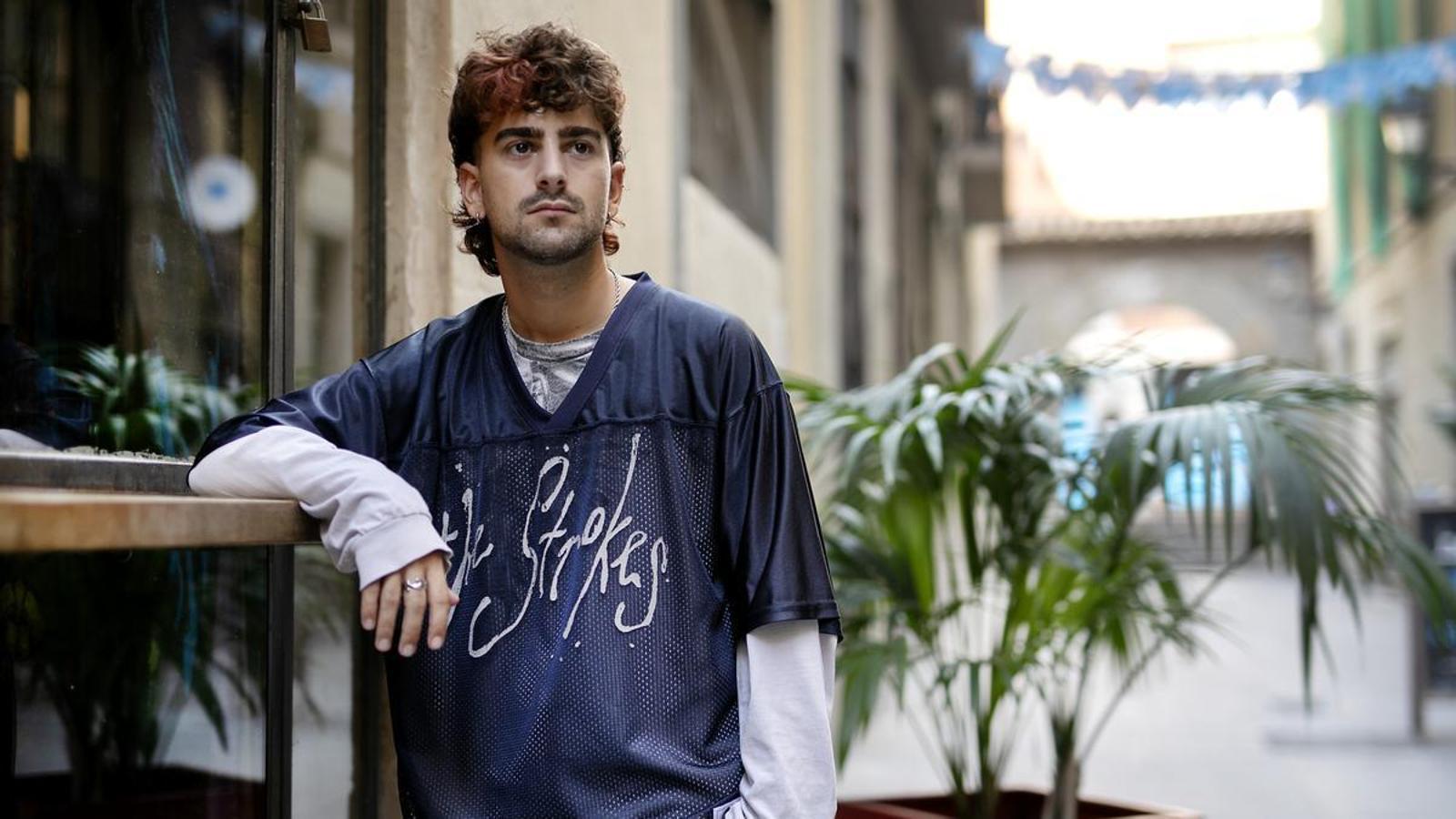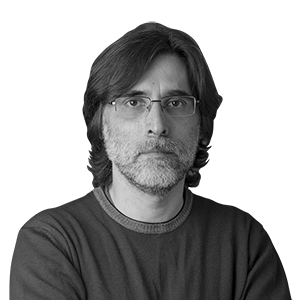Triquell: "There have been times when I haven't tolerated criticism, and that has eaten me up inside."
Musician. Releases the album 'Paco Deluxe'


BarcelonaFrancesc Fuentes Triquell (Barcelona, 2000) continues to forge a unique path in the world of music. Two years afterBetween fluids and of the EP FOMO, publishes Paco Deluxe (Halley Records, 2025), an album in which he stirs different emotional states without renouncing musical hedonism. Sometimes with the beat of dark electronics, others with luminosity. All this with a title that pays homage to a familiar name. Triquell presents the album in Vic Live Music Market On September 19th, at the Santa Tecla festival in Tarragona on the 20th, and at the La Merced festival in Barcelona on the 26th. Just before the interview begins in the ARA newsroom, and with the recorder still off, an informal conversation includes a comment about hidden pleasures. When the recorder starts, the first question seems obvious.
Do you have any hidden pleasures?
— Yes, I have many. One is cuddling my cats and listening to them snore. Another hidden pleasure is that I've given up beer, and now I'm more of a fan of white wine. Normally, the budget is tight, but it surprises me because I like tasting wine, and I didn't before. I also really like the new narrative forms of certain video game sectors. I've discovered video games that, for me, are the new form of literature. Very beautiful productions are being made, with a lot of scriptwriting and character development.
There are things on the album inspired by video games, right?
— Yes. I guess it's our way of traveling these days. Since I don't have a budget and I'm not comfortable with the white tourist role I play when I travel, I like to travel through fiction, and in different eras. For example, with Red Dead Redemption, which is a game that I really liked.
Speaking of hidden things, how is it that the song Cousin and boss isn't it posted on Spotify?
— It's on the physical editions of the album, but not on the digital editions. This gives us one more reason to consume physical music. Plus, Cousin and boss It has its own identity because we made a music video that we really like. We invented a fictional film in the context of a kind of satire about what it means to be cousin and boss, which is what I am. I am boss because I have a limited company, which is an SME. And cousin Because, sometimes, having the hierarchical role in the projects you have to carry out makes you feel like the most loser of all, and even more so when you're not riding on the dollar, but immersed in a dynamic of subsistence, which is what I believe affects 99% of us creatives.
Musically, there are many stylistic contrasts on the album. What were you looking for?
— Another logbook. I think the only thing I have in common with my previous works is that, just as I travel through different times and contexts, I also do so in different states of mind. Sometimes irony surfaces, other times emotion, nostalgia, or the desire to say, "This will be the smoke of the century." In any case, there's the purpose of doing things our way and being motivated by new approaches.
All of this that you explain is in line with the fact that there are two producers as different as Lluís Cabot and the Grabu, TRUE?
— Yes. Grabu appeared in our orbit in a super-genuine way. One day he came to my house and told me he really liked my music. And since we had a concert two days later, I asked him if he wanted to come. In two days, he learned the live repertoire. He orbited so well, and I saw so much virtuosity that I said, "If you want, join me in creating what's next." Grabu is amazing. And Lluís Cabot is a born philosopher with an incredible understanding of context and psychology in an incredible studio. He's one of the most talented people I've ever met, and he's a great advocate for not leaving things halfway.
Maria Jaume, Gerard Quintana, Xicu and Meritxell Neddermann collaborate on the album. What do they bring you?
— Gerard Quintana is an epiphany with legs and eternal youth. Meritxell has a harmonious, heavenly voice; she's a virtuoso and a lovely person. Maria Jaume is very charismatic and a better anthropologist than I am. And Xicu is the hardest worker I've ever met and a music freak. The four of them are magic, and in close proximity. And I consider them friends.
The songs Fire and Try it! Are they the core of this record?
— Fire is one druman [with a drum'n'bass beat], and we wanted to give it an emo touch. And Try it! It's the voice of your self-centered conscience, which tells you that you should do things this way and that you're not doing it right. I really like the passage that says: "Don't sing, don't think, don't return, don't be, don't seek..." I wrote it impulsively. The reference is Numb, from U2, which says "Don't move, don't talk, don't think...". The older you are and the more aware you are of these pressures, the more you suffer from them.
Do you experience it as a personal or generational pressure?
— Totally generational. My generation lives with overwhelming pressure regarding the macro perspective of things. And I notice many common uncertainties in our generation. The feeling of pre-apocalypse in a context where so many things are beyond my control, with so many things beyond my control...
You mentioned U2. The promo sheet mentions the influence of Sade and Blood Orange. And the album begins with a critique of the world's cynicism, which reminded me a lot of Radiohead. And the danceable theme reminds me of The Weeknd.
— They're great role models, but, if you'll allow me, I'm going to criticize my role models. The Weeknd, for example, strikes me as a misogynist with a huge ego; he's a megalomaniac who's overdone it. And I find him very controversial when he talks about his sexual relationships. And with Thom Yorke, a myth has been shattered for me because he has a Zionist ideology that I find totally unsolvable. I'm in a moment of boycotting Radiohead, although I can't deny that they're people who have influenced me. But here's my reflection:Kill your idols"You can't idolize anyone.
Following the protests against the genocide being committed in PalestineHave you ever had to cancel a concert, like other artists have?
— No, but I have thought about selling my pamphlet in a context where things are happening that are infinitely more important. There's also a voice that tells me: "Relax, what you're contributing surely adds up and is born from an idealistic intention." Is it perhaps futile? Do I have less influence than I think I do? Yes. What pisses me off the most are the people who want to use the protest as a way to whitewash their image. It's no use publishing a story On Instagram, it doesn't even help me to explain to people that I give X such and such a thing, because it goes from being something genuine and good, with a pure intention, to being cynical self-promotion. I see a lot of self-promotion and a lot of self-whitewashing.
But this does not take away, for example, the importance of actions such as those being carried out by artists like Clara Peya on the flotilla going to Gaza.
— This is admirable. He's much more useful than I am in that conflict.
I respect in the first interview we didI see your concerns have changed a bit. At first, you were more protective of your privacy, probably because you were coming from the overexposure of the program. Euphoria. Now I find you very different.
— I've relativized my troubles a lot. When you put your troubles into context and compare them with the troubles everywhere, you have to say, "Hey, I have reason to be grateful." What's wrong with me being worried? Obviously, we all have reasons, but I also have many reasons to be grateful. Now, I only find gratitude in microclimates: in my immediate surroundings, in the people I work with, in the people I live with, and in very banal and traditional things.
You say that music and experiences go hand in hand with the environment we surround ourselves with. Over these past two years, what experiences have you had that you think have been reflected in your music?
— Living. Being disappointed and realizing that someone you thought would be there for you unconditionally isn't there. People who have been much more present and loved you through tough times, and suddenly you miss them. Seeing family and saying, wow, it's been three months since I've had a good time with my sister or brother. I've also reflected on what I do. After two summers of touring, maybe it's not necessary to tour this summer. I won't stop making music just because I'm not touring. You think, "Do I want to be this? Do I want to be in a competitive dynamic? What's the fight I like?" The one I've had to fight, and the one I'm proud to be fighting.
And, professionally, does it compensate you?
— There have been more self-destructive phases, but also others very aligned with expectations. There have also been times when I haven't tolerated criticism, and that has eaten me up inside. But at other times, I've realized that it's not in my hands. Whatever happens, whether I fill it or not, sell it or not, success or failure, let whatever comes, come. I will try to be in harmony. Unless something untoward happens that prevents me from being in harmony, which often happens.
Have you ever sabotaged yourself?
— I am the master of self-sabotage. Self-sabotage is born from introspection. I used to be a big defender of introspection, but it's very dangerous because when you go too far you become a narcissist, you think you're the center of the world and the I monopolizes your thoughts.
You'll now be doing three concerts and won't be performing again until May...
The thing is, winter in Catalonia is conceived behind closed doors. And you have to know when to stop and when to come back. Plus, of course, I'm the narrator in the musical Blood brothers, which premieres in December at the Teatre CondalDani Anglès called me and explained why he thought I was the right person to narrate the new Blood brothersHe convinced me in a very romantic and realistic way.
